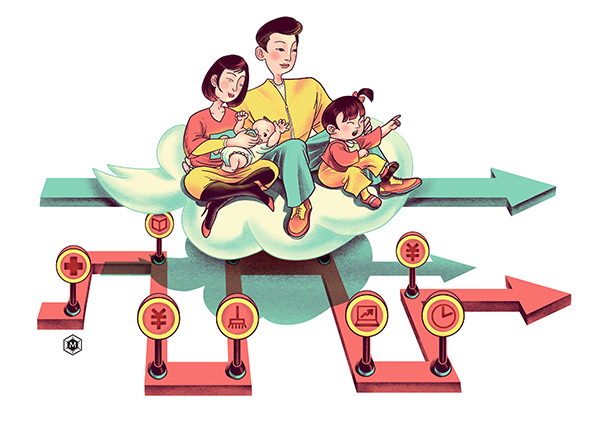Specific policies needed to raise birthrate
By Li Jianmin | China Daily | Updated: 2018-03-16 06:52

That the National Health and Family Planning Commission will be transformed into the National Health Commission, by also incorporating the elderly care organizations and some health agencies under other ministries, has sparked heated discussions on its far-reaching impact. The decision to set up a new commission to manage family planning and provide public services is a timely response to the demographic changes in the new era.
There have been concerns on whether the two-child policy, which was implemented in October 2015, will yield the desired results. According to the National Bureau of Statistics, the newborn population in China increased by 1.31 million to 17.86 million in 2016. The growth could be attributed to the two-child policy, because the number of women of childbearing age had declined in 2016 compared with that in 2015. But the growth rate lost momentum in 2017, with the newborn population falling by 630,000 compared with 2016, apparently because the number of women in the 20-29 age group decreased by 6 million.
The changing demographic structure is one of the main reasons for the declining newborn population. But the root cause of the problem is the declining desire among couples to have children.
Surveys show young couples' desire to have children in some parts of China is quite low, which is a problem deserving serious attention as China faces the challenge of an aging population. The low "fertility desire" level among young couples means China may not have the replacement fertility rate, and thus could face a super-aging society, in the near future.
The reason why couples are reluctant to have two children-with some not wanting any children at all-is that couples of childbearing age are facing tremendous pressure on multiple fronts.
Given the severe competition in society, most people suffer from excessive stress from study and work, with youths being most sensitive to such pressures. Also, thanks to the high living cost, especially extremely high housing prices, a large number of youths are opting to get married later than usual, and postponing their plans to have a child. Plus, migrant workers in the cities are finding it increasingly difficult to get married and have children, because of the heavy work pressure and a lack of housing facilities and stability.
The huge burden of children's education, too, has prevented some couples of childbearing age from having even one child, let alone two children.
It is because of these factors that the two-child policy has not yielded the desired results. So more proactive, direct and comprehensive policies should be worked out and implemented to promote childbearing.
To begin with, China needs to draft financial support policies, which can effectively reduce the economic burden of childcare on families. These policies should include exempting young parents from paying individual income tax, and subsidies for families in need, especially low-income and single-parent families.
Second, financial investment in children's healthcare sector should be increased, pediatric medical and health resources distributed in a more balanced manner, and free or subsidized medical services provided for disabled children.
Third, children's education expense should be reduced by a large margin, by massively investing in the education sector, extending compulsory education from nine to 12 years, and reducing higher education fees.
Fourth, young people should be given affordable housing, as housing is a major requirement for marriage and having a child. And affordable housing should include provisions for housing subsidy and the creation of a regulatory rental housing market for young people.
Fifth, the reproductive health service should be upgraded, prenatal care services expanded and the supply and quality of medicines improved to safeguard the health of pregnant women and newborns.
Sixth, a work culture that strikes a balance between parenting and work should be promoted, and the number of nurseries for infants increased to meet the social needs of childcare.
And effective measures should be taken to eliminate gender discrimination in the job market in order to help women to not only secure their jobs but also to give birth.
The author is a professor at and the director of Institute of Population and Development at Nankai University.
























